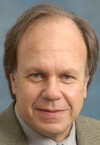Dr. Timothy Mousseau with more about Chernobyl’s effect on wildlife / Dr. Caldicott’s speech in Berlin
Listen Now Download the show by right-clicking the link.
Mousseau
This week’s guest is Dr. Timothy Mousseau, a professor
of biological sciences at the University of South Carolina. For the past 12 years, Dr. Mousseau and his colleagues have been studying the ecological impacts of the Chernobyl disaster on wild plant and animal populations living in the so-called zone of alienation surrounding the destroyed nuclear power plant. Dr. Mousseau is considered one of the leading world authorities concerning the impacts of low-dose radiation on natural ecosystems. For background, check out Pictures: Animals Inherit Mixed Legacy at Chernobyl and Chernobyl Birds Have Smaller Brains. Watch the BBC interview with Mousseau. In this interview, Dr. Mousseau discusses his research team’s continued findings of major abnormalities in birds and other wildlife in the Chernobyl exclusion zone, the effects of radiation on genes, and the prognosis for human, animal and plant life in the areas affected by the Fukushima disaster. Listen to Dr. Caldicott’s earlier interview with Dr. Mousseau. And listen to her interview with Dr. Janette Sherman, who edited the report for the New York Academy of Sciences which concluded that nearly one million people have died as a result of the Chernobyl disaster. Read Dr. Caldicott’s December 2 New York Times op ed, After Fukushima: Enough is Enough. In the last quarter of the program, we hear a segment of Dr. Caldicott’s April speech in Berlin at the Timebomb Nuclear Power: 25 Years after Chernobyl conference sponsored by IPPNW, in which she talks about the unprecedented Fukushima nuclear accident.